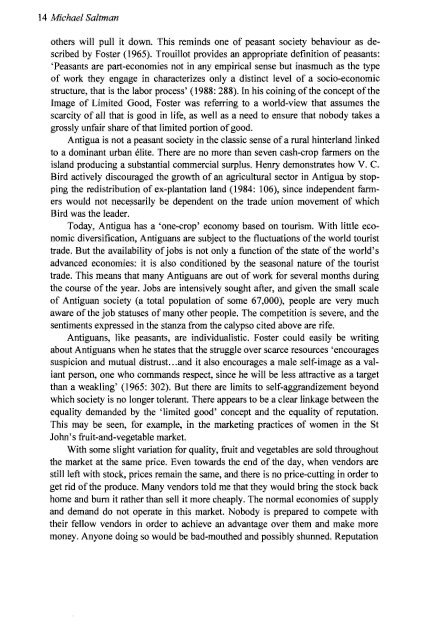JASO - Institute of Social and Cultural Anthropology - University of ...
JASO - Institute of Social and Cultural Anthropology - University of ...
JASO - Institute of Social and Cultural Anthropology - University of ...
You also want an ePaper? Increase the reach of your titles
YUMPU automatically turns print PDFs into web optimized ePapers that Google loves.
14 Michael Saltman<br />
others will pull it down. This reminds one <strong>of</strong> peasant society behaviour as described<br />
by Foster (1965). Trouillot provides an appropriate definition <strong>of</strong> peasants:<br />
'Peasants are part-economies not in any empirical sense but inasmuch as the type<br />
<strong>of</strong> work they engage in characterizes only a distinct level <strong>of</strong> a socio-economic<br />
structure, that is the labor process' (1988: 288). In his coining <strong>of</strong> the concept <strong>of</strong> the<br />
Image <strong>of</strong> Limited Good, Foster was referring to a world-view that assumes the<br />
scarcity <strong>of</strong> all that is good in life, as well as a need to ensure that nobody takes a<br />
grossly unfair share <strong>of</strong> that limited portion <strong>of</strong> good.<br />
Antigua is not a peasant society in the classic sense <strong>of</strong> a rural hinterl<strong>and</strong> linked<br />
to a dominant urban elite. There are no more than seven cash-crop farmers on the<br />
isl<strong>and</strong> producing a substantial commercial surplus. Henry demonstrates how V. C.<br />
Bird actively discouraged the growth <strong>of</strong> an agricultural sector in Antigua by stopping<br />
the redistribution <strong>of</strong> ex-plantation l<strong>and</strong> (1984: 106), since independent farmers<br />
would not nece;;sarily be dependent on the trade union movement <strong>of</strong> which<br />
Bird was the leader.<br />
Today, Antigua has a 'one-crop' economy based on tourism. With little economic<br />
diversification, Antiguans are subject to the fluctuations <strong>of</strong> the world tourist<br />
trade. But the availability <strong>of</strong> jobs is not only a function <strong>of</strong> the state <strong>of</strong> the world's<br />
advanced economies: it is also conditioned by the seasonal nature <strong>of</strong> the tourist<br />
trade. This means that many Antiguans are out <strong>of</strong> work for several months during<br />
the course <strong>of</strong> the year. Jobs are intensively sought after, <strong>and</strong> given the small scale<br />
<strong>of</strong> Antiguan society (a total population <strong>of</strong> some 67,000), people are very much<br />
aware <strong>of</strong> the job statuses <strong>of</strong> many other people. The competition is severe, <strong>and</strong> the<br />
sentiments expressed in the stanza from the calypso cited above are rife.<br />
Antiguans, like peasants, are individualistic. Foster could easily be writing<br />
about Antiguans when he states that the struggle over scarce resources 'encourages<br />
suspicion <strong>and</strong> mutual distrust. .. <strong>and</strong> it also encourages a male self-image as a valiant<br />
person, one who comm<strong>and</strong>s respect, since he will be less attractive as a target<br />
than a weakling' (1965: 302). But there are limits to self-aggr<strong>and</strong>izement beyond<br />
which society is no longer tolerant. There appears to be a clear linkage between the<br />
equality dem<strong>and</strong>ed by the 'limited good' concept <strong>and</strong> the equality <strong>of</strong> reputation.<br />
This may be seen, for example, in the marketing practices <strong>of</strong> women in the St<br />
John's fruit-<strong>and</strong>-vegetable market.<br />
With some slight variation for quality, fruit <strong>and</strong> vegetables are sold throughout<br />
the market at the same price. Even towards the end <strong>of</strong> the day, when vendors are<br />
still left with stock, prices remain the same, <strong>and</strong> there is no price-cutting in order to<br />
get rid <strong>of</strong> the produce. Many vendors told me that they would bring the stock back<br />
home <strong>and</strong> bum it rather than sell it more cheaply. The normal economies <strong>of</strong> supply<br />
<strong>and</strong> dem<strong>and</strong> do not operate in this market. Nobody is prepared to compete with<br />
their fellow vendors in order to achieve an advantage over them <strong>and</strong> make more<br />
money. Anyone doing so would be bad-mouthed <strong>and</strong> possibly shunned. Reputation

















